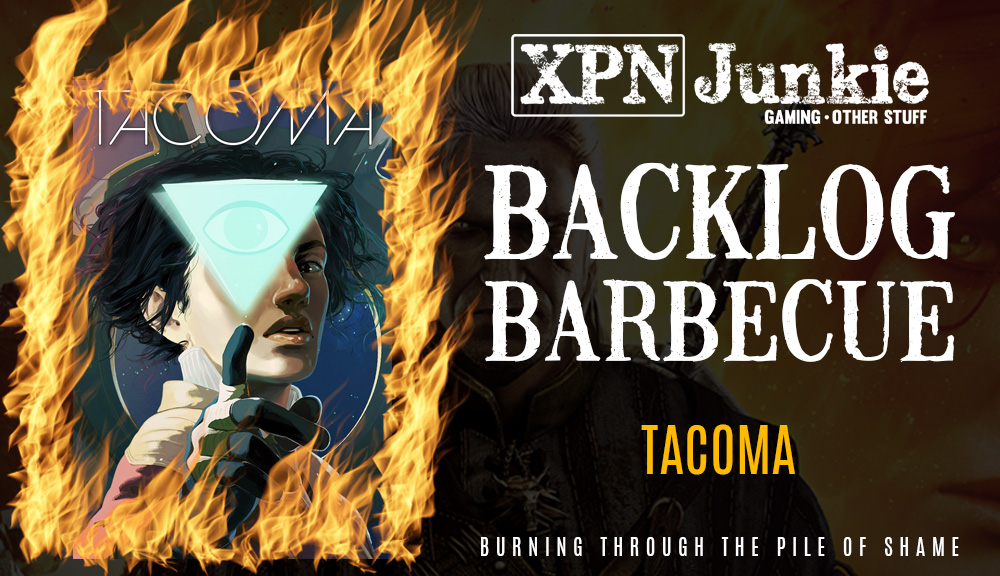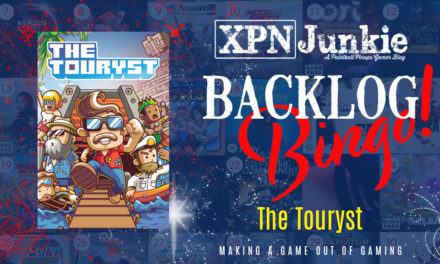I’m weirdly intrigued by walking simulators. I think it’s because they’re vaguely reminiscent of old puzzle adventure games like Myst or The 7th Guest (minus the puzzles). In those old games, the story usually revolved around a mystery or end goal, such as escaping an island or discovering what tragedy befell the members of a party. The denouement was the payoff for all your hard work.
The problem with walking simulators is that there is no hard work. Because of this, the story needs to be good. Like, really good. I’ve played a few of these, not all of them have been great, but I’ve really only disliked two of them. Gone Home was one of them, and the other was Tacoma. Both games were made by the same developer.
Now, I’ve already voiced my opinions on Gone Home. I felt like the story piggybacked on a particular topic, and while I don’t have anything against that subject matter (spoiler: she’s a lesbian), I did have a problem with the fact that the story was extremely tame and in no way held up to the initial mystery. I didn’t care any more for the character at the end than I did at the beginning. Perhaps as a straight male, it didn’t resonate with me for obvious reasons, but that doesn’t mean I’m incapable of enjoying a well-written story, regardless of its subject matter.
I feel the same way about Tacoma. The setup and initial mystery of Tacoma is very intriguing, you play as a female engineer investigating an abandoned space station (of sorts) to discover what happened to its crew. This is done in a unique way, and I have to give developer Fullbright some credit here; the story is told via recorded holograms that replay the events of the previous days, weeks, etc. The player is given a media player type HUD that allows them to rewind, pause, etc., which is necessary because different conversations will unfold in different parts of the station, and the only way to get it all is to rewind the recording to get the other pieces in. It’s cool, and I really liked that mechanic. But it was that mechanic, and that only, that kept me invested enough to see the game through.
I won’t reveal the plot here, for those of you that do want to experience it (if you haven’t already, the game’s been out for a while now). Suffice it to say though, it’s just not all that interesting. It focuses on the professional and personal relationship within the crew and how they deal with an impending crisis. Again, the story seems to place an emphasis on a lesbian couple. Even though there are other crew members with their own heterosexual relationships outside of the crew, the two women are the only ones that are there together. The reason I bring this up is because it once again seems like the developers made it a priority and wrapped a story around it. I wish I knew of any other way to describe it, but I can’t. In Gone Home, it was the story, so it was understandable. It just wasn’t that good.
In Tacoma, these two get a good chunk of what little screen time there is to go around, for no other reason than to say “Hey look at us, we’re lesbians.” Everything else seemed secondary, even the overall story. The impending doom of everyone on the station is averted in the simplest and most mundane way possible. As I played I refused to believe that that was the end. Until I pushed the button and sat in the seat and watched the credits.
My mouth was open in the same droopy “that’s it?” expression I had at the end of Gone Home. Again the story was a letdown, and… you know what, fuck it, I’m spoiling this shit.
You get to the station, and within the first few minutes, an explosion goes off during on of the holograms, revealing that oxygen tanks had combusted and the crew is basically on life support. This leads to a number of conversations about what to do; should they go into cryostasis or try to survive until help can arrive? This argument is rendered moot as they realize they can’t call out either. The computer A.I., ODIN, which plays an integral part of the story, informs the one in charge (I forget her name) that there’s a secret room that’s usually off-limits, but is now accessible. She goes in there and finds a pre-recorded message about their deaths and the incident on a server (why was it on their local server?) It turns out the “accident” was staged so they would die and the company in charge would have an argument for automated stations where no humans would be at risk. The A.I. also informs her that she can call out from that terminal. She does, and they are retrieved by a different ship taken to a nearby planet. Basically, they call an Uber.
The “twist,” if you want to call it that, is that your character doesn’t work for same company that the crew did, she works for a group that rescues sentient A.I. and offers them sanctuary. She takes ODIN, asks him if he wants to come with, and he’s like, “Duh, wtf else am I gonna do,” and they leave. The End.
As I’m typing this, I’m looking at the summary and thinking, “Ya know, that could’ve been good.” Much like Gone Home could’ve been good. But, much like Gone Home, their big story equates to nothing more than a story you’d tell over dinner. “Oh, I didn’t tell you, I got a flat tire on my way home from work. I was stranded on the side of the highway, but then I called AAA. Now I’m home.”
There was no tension, no rising action, no danger. I mean, they told me there was danger, but I never felt like there was any danger. The story-telling was just so flat. All the character development in the world just doesn’t matter if the story they’re in sucks. And this story sucked.
The developers of this game need to go play What Remains of Edith Finch. That was a game that I had approximately 0% interest in, but like I said, I’m intrigued by walking simulators. I gave it a try, played it completely through in a single sitting, and hopped on the computer immediately to talk about how much I loved it. That’s what you want people to do when they play your game. Not sit and ask, “That’s it?”
So if you’re reading this, and haven’t played any of the games I’ve mentioned here, skip Tacoma and Gone Home and go play What Remains of Edith Finch. That one knows how to tell a story.





